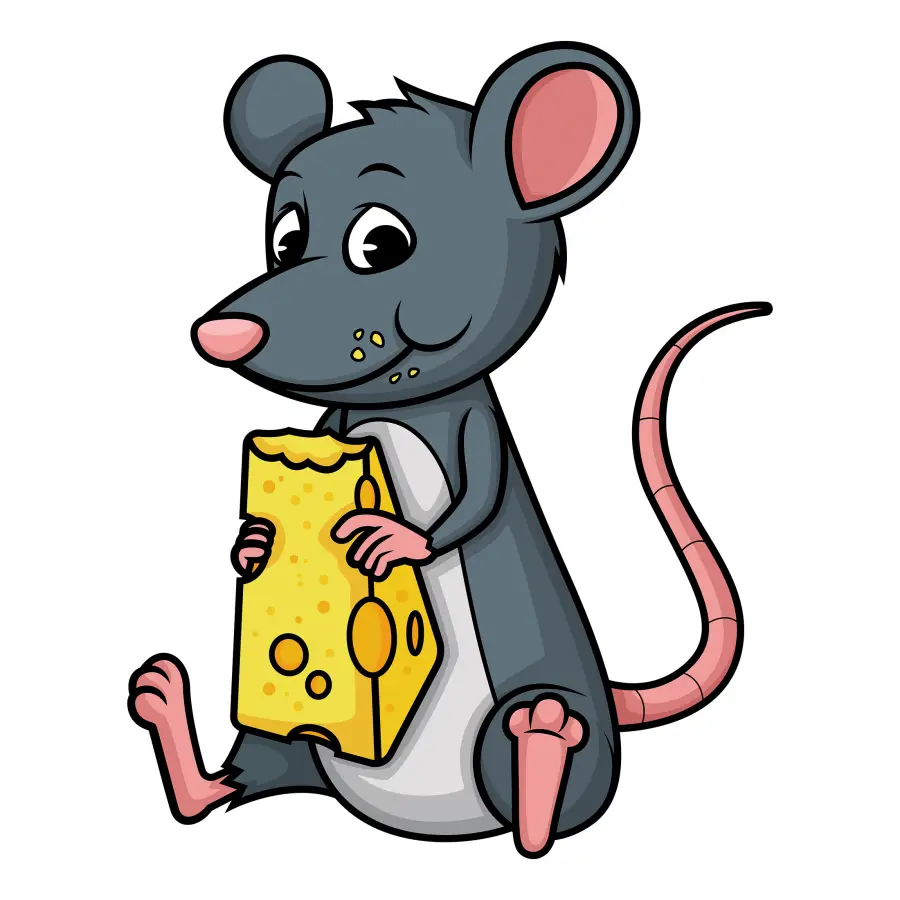Though there are many types of animals that can be nibbling on your plant leaves or flowers, there are some that you want less than others in your garden or yard. We know bunnies, deer, and other foragers do this, but what about rats? Could it be rats eating flowers or plants in your landscape?
Rats most definitely can eat flowers and plants, but to what extent depends on the type of rat. Rats will not only eat nearly anything digestible from a garbage can, they will also devour many flowers, vegetables, and plant leaves from a garden.
This is not to say that what is eating your plants and flowers is definitely or more than likely a rat. In our instance we have many rabbits around our house that stop us from seeing most of the blooms from our crocus bulbs. But if you have rats in your area, they too can do a number on your plants.
To find out if this could be your situation, read on.

Contents
Do Rats Eat Flowers, Plants, Seeds Or Animals?
What exactly do rats eat? Are they omnivores (eating both plant and animal matter)? Do they eat dead things? What makes for a healthy rat?
Rats are omnivores that eat seeds, flowers, plant stems, leaves, fruit, vegetables, insects, and even other small animals. Depending on the region and type of rat, you will find a variety of eating habits. They are very adaptable rodents with the propensity to eat whatever is available.
For example, in a study of ‘Roof Rats’ in New Zealand published in the New Zealand Journal of Science, 276 rats were caught and the contents of their stomachs examined.
They were found to subsist on a diet of berries, seeds, and insects. They like easy to find vegetation, but make no mistake, if there were humans within striking distance of these forested areas, the contents of their stomachs would most definitely include samplings from their gardens and trash cans.
Though they prefer seeds, berries, fruit, and vegetables, your flower leaves and petals are not always safe. If there is not a plentiful food source around, or if there are many of them in one area competing for food, they will turn to certain plants in the short term.
How Do I Keep Rats From Eating My Flowers?

So, you know that it is rats in your garden or lawn beds by either seeing them or their droppings. What can you do to stop them from eating your flowers and plants? There are a couple of methods that can be more or less effective depending on the type of rat you have as a visitor and your area in general.
To keep rats away from eating flowers and other parts of your plants use coverings such as wire, plant herbs with strong odors like mint, or set traps or poisons to catch the culprit. Traps can be kill or no kill variations depending on your sensibilities and goals.
Rats can most definitely do noticeable damage to your flowers and plants. Stopping them is not an easy task though, since where you see one rat, there are mostly likely many more.
For those that are fans of these rodents (and there are many that keep domesticated rats as pets) it is a source of sadness that they regularly die at around the 2 year mark due to respiratory infections. For those wishing to keep them away from their homes and gardens, there is most likely a different reaction to this bit of info.
Controlling a growing rat population is no small undertaking. Rats due to this short life span have adapted by having many offspring. Those animals in nature that live a long time tend to have less viable babies, whereas those that are fragile or vulnerable, tend to have many. Rats are of the latter.
This means that keeping rats away from your plants means dealing with several of them rather than just one or two. Let’s look a bit closer at some of these options.
Plant Covers To Stop Rats
The use of plastic containers with holes in them while a plant is sprouting from a seed is a good way to deter rats from eating the seed before it even has a chance to grow. These rodents are highly likely to dig up seeds if they are plentiful in your area.
Other forms of covers can take the form of chicken wire domes or structures designed to keep rats from attacking larger plants, vegetables, or flowers. These can cover one specific plant at a time or whole groups depending you the situation.
Though rats can climb on the outside of the chicken wire, they normally cannot chew through it unless there are weak spots in what it is hooked to.
Other articles from LawncareGrandpa.com you will like…
- Do Rabbits Eat Cucumber Plants? (Revealed)
- Do Squirrels Eat Grubs In Your Lawn? Moles, Birds, Etc
- Is TruGreen Safe For Pets? (Explained)
Planting Strong Smelling Herbs To Deter Rats
Some swear by herbal and natural smells to repel certain animals and pests. Others don’t share the same confidence in their use. Nevertheless, many use herbs like mint as a rat deterrent as well as for other pests.
Some of the most common smells coming from herbs that are said to repel rodents like rats are mint, thyme, basil, and garlic. These will have to be either placed along side of the desirable plants or in the areas rats may use to enter the area.
Though these may not be a complete solution to your problem (rats are determined creatures), together with others, it could be the thing that turns them away for good.
Select Plant Varieties That Rats Don’t Like To Eat
Rats tend to like leaves and vegetables that are mild in taste and spiciness. They love eggplant, lettuce leaves, and many other mild tasting fare. There are some flowers that they prefer over others as well. So, what types of plants can you specialize in that will not offer up their preferred lunch or dinner?
Rats do not like spicy or very flavorful greens or vegetables. Peppers, mustard greens, and dandelions are three of the more successful plants that deter rats from nibbling either on the plant leaves, flowers, or vegetables. Other varieties similar to these are great in areas where rats are common.
It may seem extreme to completely change what you tend to grow in your garden or flower bed, but for those that have dealt with these hardy rodents, these types of measures could save a lot of stress.
Another reason this type of solution could be up your ally is coming up next when we look at what a rat infestation is and what having the most efficient rat hunting animals take care of the problem looks like. It is rather shocking. Sometimes avoidance is the best answer.
Keep Grass Short To Stop Rats From Eating Plants
Rodents of all types are natural prey for larger birds and other animals. Rats are no exception. Though they are less hunted than mice, they still prefer ‘the shadows’ when looking for their next meal.
Keeping grass short around flowers and other plants deters rats by removing the cover they want when moving in the open. Shorter grass leaves less hiding spots and makes them feel more vulnerable. Long grass allows them to move relatively freely.
Other than keeping your HOA, neighbors, and city codes enforcement happy, keeping your grass on the shorter side can help curb the movements of many rodents and would be plant destroyers in your lawn.
Dogs Not Cats Are The Top Rat Hunters
Looking for that barn cat to take care of your rat problem? Well, ‘barn cats’ that are on the feral side are great at catching mice and other small rodents like chipmunks, but rats can get rather large for them. Not only that, larger rats tend to be aggressive and are known to fight back against cats and even humans.
Surprising to some, dogs tend to be the best rat hunters. There are specific breeds that are better than others at killing rats, but most dogs’ size and hunting abilities are better suited for eradicating a rat population and many farmers use them for this purpose.
If killing the rats is not something that you are opposed to, then having a natural rat hunter like the right canine around can solve your problem quickly. But be warned, many of these dogs are efficient and brutal. If you are squeamish about how animals hunt, this option may not be for you.
Traps And Poisons For Rats Eating Flowers And Plants
Some people may not see any problem in killing rodents that are coming into their yard and homes. Others may find it unacceptable. There are solutions for both of these points of view when dealing with rats in your garden.
There are several types of traps and poisons that are very effective in controlling rat populations. Cage traps can catch live animals from mice and rats to ones as large as raccoons and skunks. There are also kill style traps and potent poisons that work very well.
Some of the most popular and effective poisons that I have used with great success in the past come from d-Con. Here is a link to a popular version on Amazon.
If you are looking for a less lethal way to deal with your rat problem, I have used these many times. They are cage style traps that hold the live animal until it can be released away from your property. Here is a link to Amazon for one that I would recommend for rats.
Do Rats Destroy Flowers?
If rats decide to burrow in a flowerbed then does that disturb the root systems of flowers? What about the ones they eat on? Does this kill the flowers?
For the most part, rats will not eat entire plants, including flowering varieties. They are normally looking for seeds, berries, nuts, lettuce leaves etc. Sometimes they may eat portions of the flowers themselves, but even then this will not normally kill the plant.
If you are growing lettuce, you may come out to find that indeed, the entire plant has been devoured. Yet, when dealing with certain types of flowers, the pedals and some of the leave may be what rats want most. Unlike vegetables like lettuce, the entire plant is usually not what a rat is looking for.
Burrowing can disturb some root systems, but for the most part it shouldn’t kill many of the plants they are under unless food is very scarce and they choose to munch on the roots themselves.
With rats eating everything from dead animals to fruits and veggies, flowers and plant leaves end up on the bottom of their preferred meal list. If you have a garden, they will usually bypass flowers to get at the veggies or fruit.
The Final Touches On Rats Eating Flowers And Plants…
Rats have many habits that annoy or even endanger humans and their food supply. It is important to know the extent of your problem before trying to address it. If you are near larger cities, sewers and storm drains could be the source of your problem.
If you live in suburbs or rural areas, the type of rat can be different and less harmful to humans directly. These tend to munch on our plants in gardens and flower beds. When many of your plants have been harmed and you find that rats are the culprits, it may be time to call in a professional.
If it is the occasional nibble here and there, hopefully some of the advice above can help you deter the furry varmints.
More articles you will enjoy…
